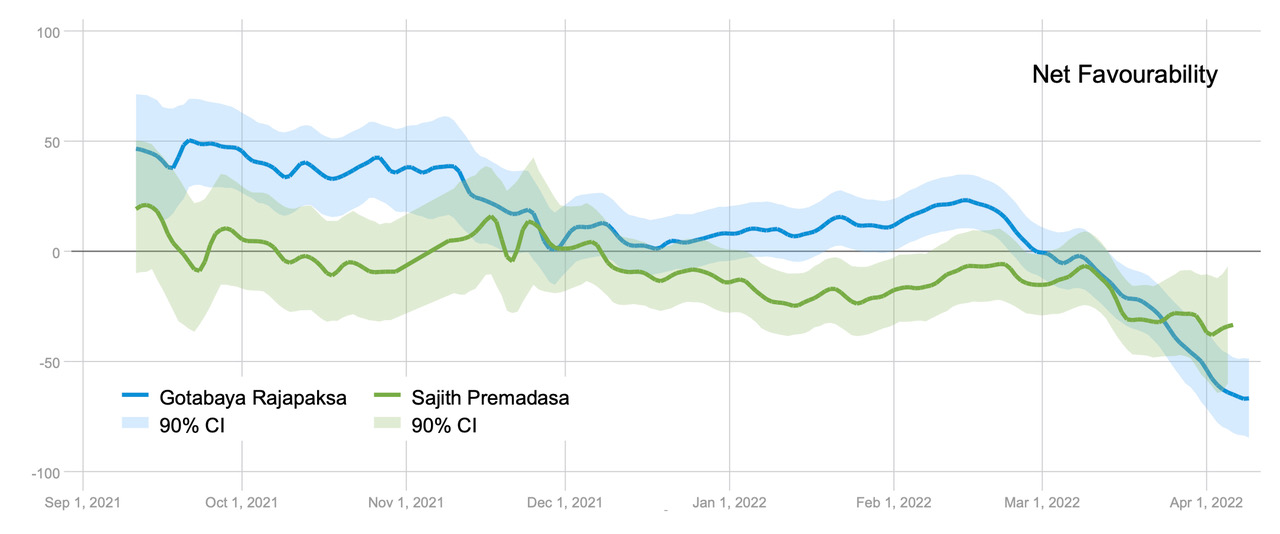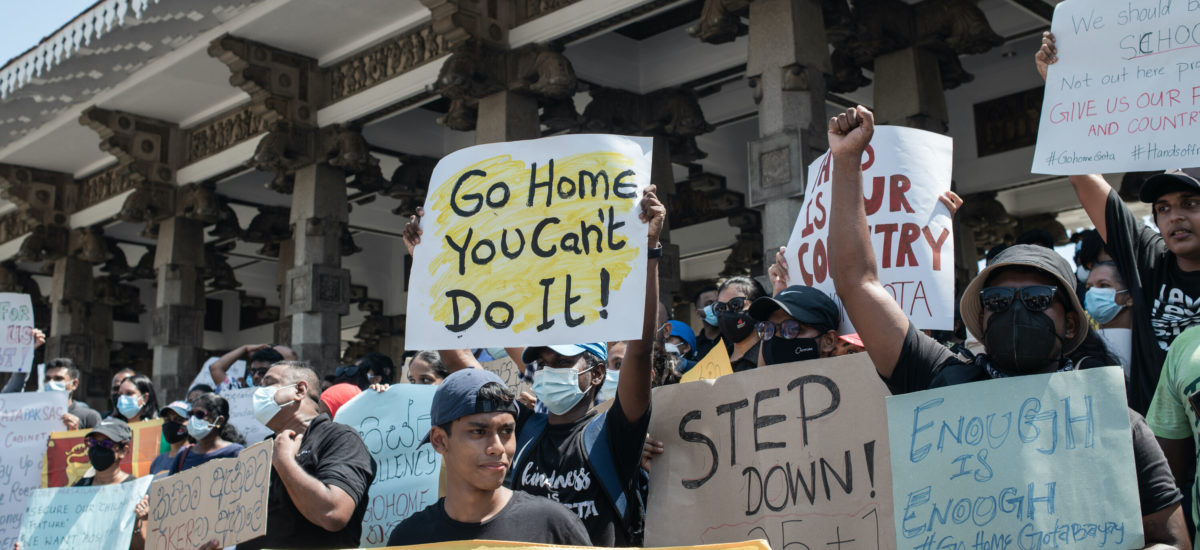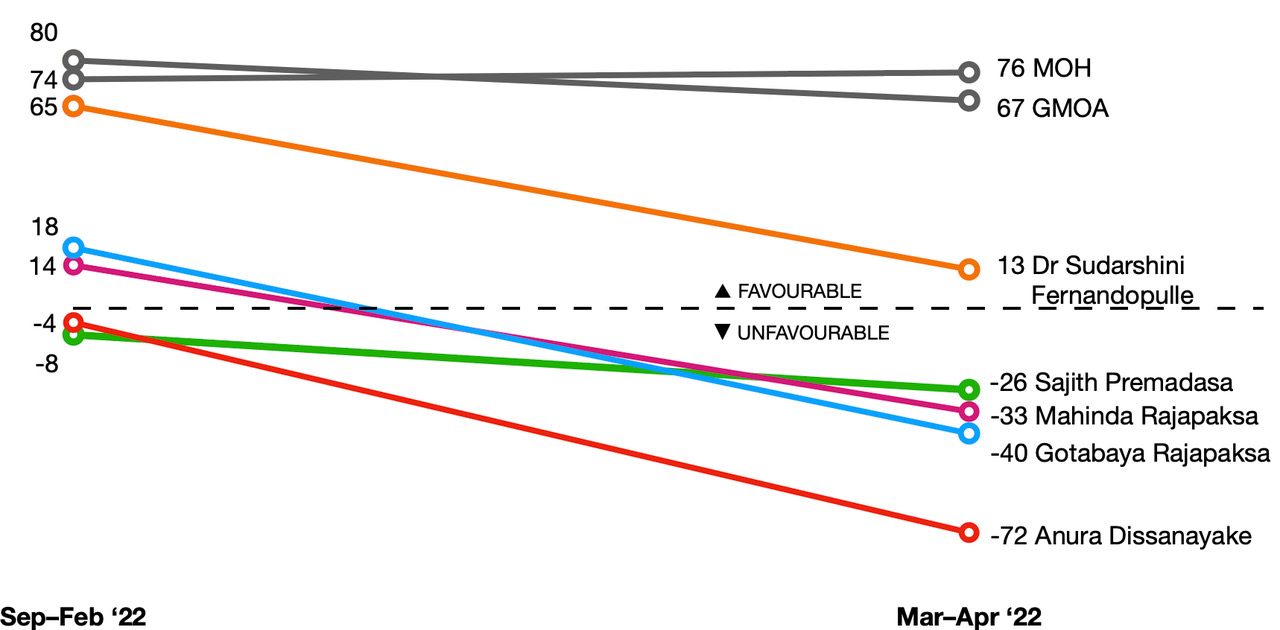Photo courtesy of The New York Times
The unprecedented national crisis has led to a collapse in the public liking of all politicians. At the Institute for Health Policy (IHP), we have been tracking favourability of several institutions and political personalities since last year. The past two months has seen substantial declines in favourability of all politicians. This has affected politicians in both government, such as the President and Prime Minister, and opposition politicians, and in opposition, such as Opposition Leader Sajith Premadasa, JVP leader Anura Dissanayake and UNP leader Ranil Wickremasinghe. It’s also hit the favourability of politicians who were previously popular such as former minister, Dr. Sudarshini Fernandopulle, who has consistently remained the most popular politician we track.
This public displeasure is specific to politicians. Favourability of state institutions or other organisations, such as the Ministry of Health, the GMOA or the armed forces, has remained positive and largely unaffected. These low levels of favourability of politicians may matter, since the willingness of the public to acquiesce in painful, but necessary, actions may depend on how they feel about the political leaders calling on them to make sacrifices.
| Changes in net favourability of selected politicians and institutions from Sep. 2021–Feb. 2022 to Mar.–21 Apr. 2022 |
| Institute for Health Policy Sri Lanka Opinion Tracker Survey |
| Chart displays net favourability, excluding refusals and non-responses. Estimates are adjusted to match the national adult population by gender, age, education, ethnicity, socioeconomic status, province, sector of residence, and Presidential Election 2019 voting choice. Sample sizes vary between political figures, as questions posed to differing proportions of overall sample. Data from 4,603 respondents interviewed from Sep. 2021 to 24 Apr. 2022. |
President Rajapaksa’s favourability hit most
From August 2021 to early 2022, President Gotabaya Rajapaksa’s net favourability rating remained positive, although the lifting of the August–September 2021 lockdown resulted in his favourability declining from +50 levels to the low tens by January 2022. This can be contrasted with Opposition Leader Sajith Premadasa, whose net favourability was often negative throughout this period, largely because of high levels of unpopularity amongst better-off Sri Lankans.[1] The President also maintained a higher favourability rating than Prime Minister Mahinda Rajapaksa, many other ministers, and other opposition leaders, although lower than a few ministers, notably Dr. Fernandopulle.
This all changed in the last two months. The President’s favourability ratings have cratered. His net favourability fell from +20 during February to below -80 during the first three weeks of April, meaning that for every member of the public who has a favourable opinion about him, there are now nine others who say they have an unfavourable opinion. This decline in favourability has been faster and more extensive than most other politicians. Consequently, during March-April,[2] the President’s favourability rating (-40) fell below those of both Prime Minister Mahinda Rajapaksa (-33) and Opposition Leader Sajith Premadasa (-26).

| Institute for Health Policy Sri Lanka Opinion Tracker Survey |
| Shaded areas represent estimated confidence intervals. Estimates for Sajith Premadasa in April 2022 incomplete owing to insufficient sample to provide reliable estimates. |
President’s favourability declined most among the poor, women, urban and Sinhala adults
Analysis of our data[3] indicates that the most significant declines in the President’s favourability have been amongst the poor, women, urban and Sinhala adults. Amongst the poorest one third of Sri Lankans, the President now has very negative favourability ratings (-63), unlike Sajith Premadasa whose ratings are only modestly negative (-6). In the case of women, the President has lost the edge in favourability that he has long enjoyed over Sajith Premadasa. Women view both unfavourably now, but the President (-42) more than the Opposition Leader (-27). The only segment of the population where the President has managed to retain his previous levels of favourability was the Southern Province, but elsewhere his favourability fell. Interestingly, his colleague, Dr Fernandopulle, former state health minister, not only managed to retain more of her favourability, but our data also indicates a significant gain in favourability amongst government employees. In contrast, Sajith Premadasa’s more modest decline in favourability was more dispersed, although he also suffered a further loss in favourability amongst women, albeit less than the President.
Lack of trust in politicians makes current challenges harder to solve
The current economic crisis that the country is in will require adjustments that are difficult and painful in the short-term. Taxes need to go up and prices will increase for most things. Living standards will fall for most Sri Lankans in the short-term, whatever we do. How the burden of these painful adjustments will be distributed between poor and rich, how these sacrifices are communicated and justified to the public, how social cohesion is maintained, and social unrest is prevented will require effective and determined national leadership to make the correct choices, to communicate clearly to the public, and to build a minimum social consensus. That is the need of the hour, but the evidence of widespread disillusionment with all politicians makes the challenge even greater.
The public dislike of almost all politicians implies that no single political party today will enjoy the public’s confidence in resolving the crisis. It points to the need for fresh thinking by the political establishment on how to formulate and communicate a package of measures that will have consent from different parts of society, and how to provide the leadership needed to sustain the painful measures that are undoubtedly needed over the coming months and years.
How IHP tracks favourability
IHP’s Sri Lanka Opinion Tracker Survey (SLOTS) is a telephone survey that interviews nationally representative samples of the public every day, asking questions about their health, their experience of everyday life, and their opinions about a range of issues such as COVID-19 policy. SLOTS also tracks favourability, by asking respondents if they have a favourable or unfavourable opinion of a public figure or institution: net favourability being the average of the positive and negative responses. The question that SLOTS uses is a standard one used in similar surveys around the world. Scores range from +100 (everyone has a favourable view) to -100 (everyone has an unfavourable view). This is more an indicator of general sentiment about politicians than how people will vote, something that SLOTS tracks separately. For example, United States President Bill Clinton’s favourability ratings slid in his second term following personal scandals and impeachment, but his political support and job approval were lifted by a booming economy.
In our context, where public opinion polls are rare, asking this question plus questions about voting is challenging as many people refuse to answer, and particularly those who support the opposition. To control for this, we adjust our data not only to make the responses representative of the overall population in relation to characteristics such as gender, age, income level, ethnicity, and province, but also to match how people voted in the 2019 Presidential Election.
Notes
[1] Better-off here refers to the one third most affluent Sri Lankans. During the period from September 2021 to February 2022, Sajith Premadasa’s net favourability averaged +18 in the poorest one third, -5 in the middle third, and -44 in the most affluent third of the population, compared with +21, +29 and -1 respectively for President Gotabaya Rajapaksa.
[2] Estimates are for the period from 1 March to 24 April 2022, the latest date that data were available at the time of writing.
[3] Analysis based on regression analysis of factors affecting the decline in favourability between Sep.–Feb. 2022 and Mar.–Apr. 2022. All results mentioned in text were highly statistically significant (p<0.01).



